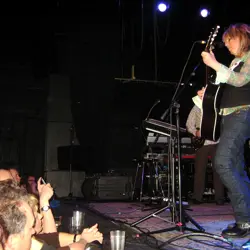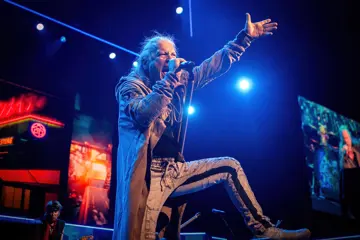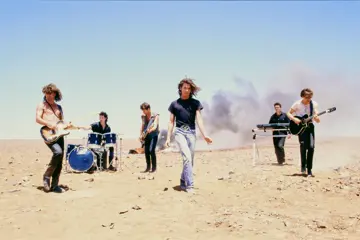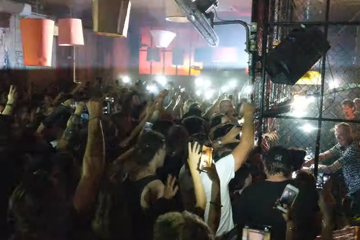 Lucinda Williams
Lucinda WilliamsYou don’t get to be called the Cosmic Queen of Americana for nothing. Now well into her fourth decade of creating and sharing beautiful country-tinged rock’n’roll, Lucinda Williams has pretty much always done her own thing her own way — her inimitable style has always served her well. Her reticence to conform and meet expectations is renowned, and her run-ins with various record labels in the ‘90s have gone down in musical folklore, so it’s really no surprise that’s she’s finally formed her own label, Highway 20, to ensure that she’s afforded that highly sought-after creative control.
What is slightly less straightforward, however, is her decision to rail against the prevailing tide of today’s internet-effected, minuscule attention spans and make her first release on Highway 20 a sprawling, twenty-song double album, Down Where The Spirit Meets The Bone. It’s not so much the volume of material that is a revelation, more the consistency; no matter what style Williams broaches across the record — and she covers plenty of musical (and emotional) terrain over the journey — she carries it off with complete panache and aplomb in her typically unpretentious manner.
“Well, I had a lot of songs when I went in, and I recorded a couple of other people’s songs too, so by the time it was all said and done we had about thirty tracks to cut and we realised that there was no way that we were going to be able to narrow this down just to one album,” she chuckles. “Everybody agreed that this had to be a double album. At first we considered putting out two separate albums at the same time, but I really didn’t like that idea, so we decided to make it a double. It’s a little chancy, it’s a little risky sometimes, but I think it works. It’s been getting a really good response from people, and I think it just made sense doing it like that because a certain amount of the songs just fit really well together.”
"I was trying to come up with some more-up-tempo songs that sort of had a little bit of a groove to them."
Despite the size of the collection, rather than predetermining a mood, Williams let the feel of the individual tracks dictate the album’s eventual direction.
“It was just an organic process as we went along,” she continues. “When I was writing, I was trying to come up with some more-up-tempo songs that sort of had a little bit of a groove to them. I’ve always loved that style that I refer to as ‘country soul’ — I’ve always loved that style of music. I’ve done it a little bit before — I’d done a few songs like that — but the thing that’s different about this album I think is that we brought in so many different kinds of musicians. I worked with my own rhythm section — the guys that I tour with — but then for most of the tracks on this release I worked with Elvis Costello’s guys, Pete Thomas (drums) and Dave Faragher (bass), and then had a slew of great guitar players so there’s a lot more different sounds on it. Usually I just go in with my road band and record the whole thing with them and then add a few overdubs, but I really wanted to flesh out the songs more on this one with all of the harmonies and stuff.”
Don't miss a beat with our FREE daily newsletter
Desolate and dusty narratives about affairs of the heart have long been Williams’ stock-in-trade, and while lyrically she obviously covers a lot of ground on the new collection she sees nothing specific tying the songs together.
“Not really consciously, other than where I’m at at this point in my life,” she considers. “Anytime I write it’s going to reflect whatever’s going on or something that I’m going through, so I guess in that regard there’s a certain thread running through them. There’s going to be a different vibe with me when I’m sixty-one compared to when I’m thirty-one or forty-one or whatever, and the older you get you experience more loss and friends dying and that sort of thing. Life is different and your perspective is different — there’s a little bit more wisdom and maturity coming through.”
Plus the way that Williams’ voice has aged is incredible, with her vocals rarely sounding more emotive than on the new record.
“That’s the other thing — I feel like I’m singing better than ever,” she concurs. “That’s another part of it that’s on another level. I feel like this album’s just kind of a whole other level for me.”
And while Down Where The Spirit Meets The Bone contains eighteen choice Williams originals, it’s bookended by two great covers; the opening track, Compassion, is adapted from one of her father Rhett Williams’ poems (a lyric which also gifted the album its title).

“I knew that I wanted to call the album Down Where The Spirit Meets The Bone — that was already decided — so the next obvious step was to try to take the poem and make a song out of it,” Williams remembers. “That’s something that I’ve been trying to do over the years, I’ve been dabbling with some of my dad’s poetry and trying to turn one into a song. It’s really hard to do, but I managed to pull it off with this one poem and get it done in time to put it on the album. It was the last thing I recorded — I just went in by myself and just did it with vocal and guitar, and at first I was going to add other instruments to it and kind of flesh it out and everything, and then we decided that it just sounded really intimate the way it was so we should just leave it the way it was.”
Rhett Williams has played a big part in Lucinda’s career, almost taking on a mentor role at times, and he’s justifiably proud at his new contribution.
“Oh yeah, he’s thrilled,” his daughter smiles. “He feels really honoured and proud of it, and I’m honoured and proud. Part of it was that I really wanted to share his talent with the world — he has Alzheimer’s right now and isn’t able to write poetry anymore, so it’s sort of like a tribute to my dad at the same time.”
Williams senior is obviously a pretty inspiring role model, because one of his throwaway comments to his daughter — during a phone call following Lucinda attending a friend’s funeral — also inspired a track on the new record, the gorgeous Temporary Nature (Of Any Precious Thing).
“That was just from a conversation with him on the phone one time a few years ago,” Lucinda explains. “I jotted down these lines when he said something like, ‘The temporary nature of any precious thing just makes it more precious’, and I was just, like, ‘Wow, that’s so profound!’ Then he said something like, ‘Sometimes the saddest joys are the richest ones’. That’s how I get ideas sometimes — I’ll hear somebody say something and just jot it down. I’m always jotting things down and making notes on napkins. I keep everything.”
When it comes time to construct actual songs from these snippets that Williams collects along the pathway of life, does she force herself into the creative process or wait for inspiration to strike?
“I just kind of wait until I have the time and I’m in the mood — it’s kinda a combination of things,” she tells. “It’s hard to say what kind of brings that on, but I’m never at a shortage of ideas and inspiration, and as long as that’s going on then I’m okay. Having to sit down and apply myself, sometimes I get distracted with other things in life. Tom [Overby, husband/manager] has to remind me sometimes, ‘Okay, you haven’t written a song in however long,’ or whatever. Although he was doing that more before we went in the studio. I have enough songs to last me for a while now — I’ve got a handful of things that aren’t finished from when I was writing before that I still want to finish.”
The closing extended rendition of JJ Cale’s beautiful Magnolia is also shrouded in emotion, given Cale’s sad passing from heart failure in mid-2013.
“Yeah, that’s a song that I used to do a long time ago back in the ‘70s when I was first starting out,” Williams reflects. “I always loved that song, and I think what sorta led to us recording that was a couple of years ago when I was on tour with my band and we were playing in Tulsa, Oklahoma — which is where JJ Cale was from originally — and he’d just passed away when we were playing there that night, so we ended up doing a version of Magnolia during the show and it sounded so good that Tom remembered how good it was. So when it came time for us to go into the studio he said, ‘I really want to cut that song’, so we did. The ending of it was real spontaneous — that was the band just going with the flow and seeing where it took us.”















